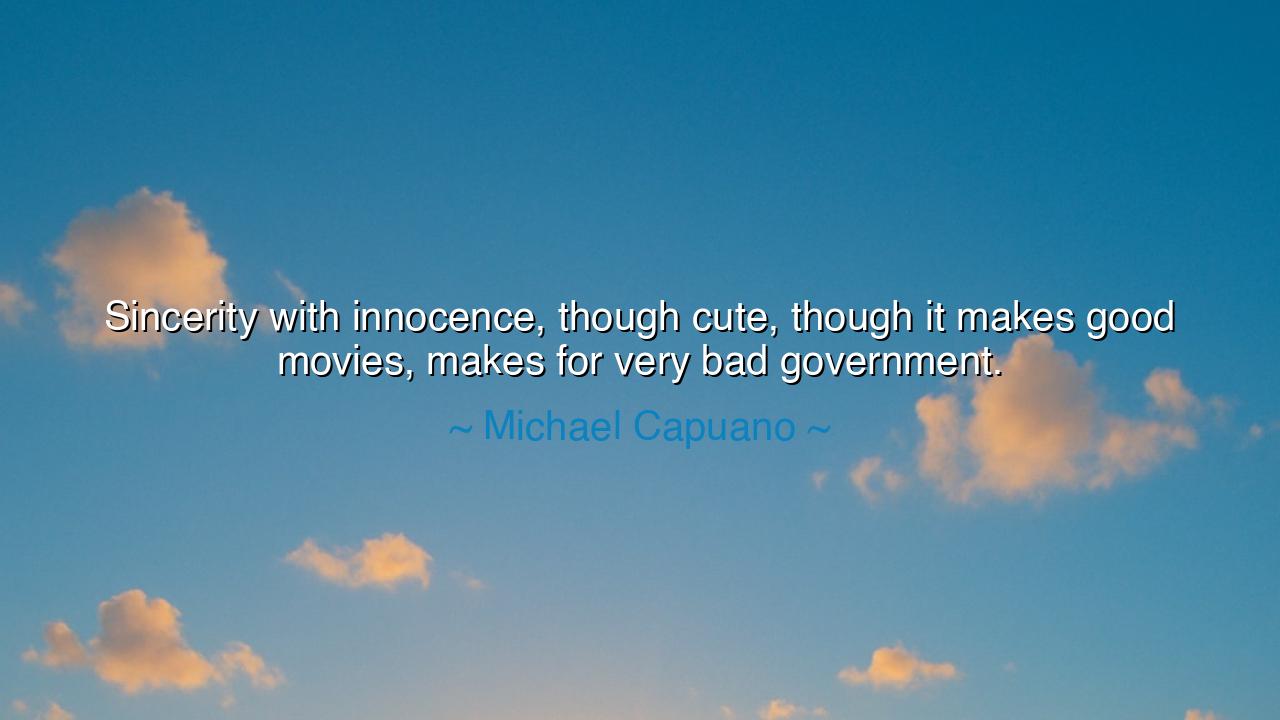
Sincerity with innocence, though cute, though it makes good
Sincerity with innocence, though cute, though it makes good movies, makes for very bad government.






The words of Michael Capuano ring with the resonance of a truth that civilizations have often learned through blood and fire: “Sincerity with innocence, though cute, though it makes good movies, makes for very bad government.” These words are not merely a witty turn of phrase; they are a warning carved into the stones of history. For in the realm of governance, where nations are shaped and destinies are forged, the virtues of sincerity and innocence, if left untempered by wisdom and prudence, become as dangerous as ignorance itself. A pure heart may charm the people, but it cannot command the storms.
In ancient times, the philosophers of Greece and Rome spoke often of the balance between the ideal and the practical. They knew that the sincere man who governs without knowledge of the world’s deceit is like a sailor who takes to the sea with no compass, trusting only in the goodness of the waves. Such trust may seem noble, even poetic, but it leads only to ruin. Government is not the place for dreams alone—it is the crucible where mercy must meet justice, where compassion must wrestle with law, and where good intentions must be tested against the harsh iron of reality.
Consider, then, the tale of the Roman Emperor Marcus Aurelius—a man both philosopher and ruler. He was sincere, deeply moral, and loved the truth. Yet even he confessed in his meditations that the purity of one’s soul is not enough to save an empire. When he showed mercy where firmness was needed, rebellions festered. When he trusted men who seemed innocent but were cunning, corruption spread. His heart was pure, but his realm was not. And so he learned that innocence may dwell in the private soul, but in the affairs of nations, it must yield to wisdom, vigilance, and strength.
In contrast, history has also shown us leaders who combined sincerity with discernment—those who tempered compassion with discipline. Abraham Lincoln, for instance, bore the weight of a nation divided, and though his heart was tender toward the suffering, his decisions were carved with iron. He did not govern as an innocent dreamer, but as one who knew that to preserve the Union, he must sometimes walk through the valley of blood. His sincerity gave him moral courage; his wisdom gave that courage direction. Thus, he stands not as one who was merely “good,” but as one who was great.
Sincerity alone is the song of the heart; government requires the rhythm of the mind. The people may love an innocent leader, for innocence is comforting—it whispers that all will be well, that goodness alone can triumph. But the wise know otherwise. In the corridors of power, wolves often wear sheep’s clothing. There, one must see clearly, act decisively, and sometimes bear the burden of actions misunderstood by those who watch from afar. Innocence, if unguarded, becomes a doorway through which corruption enters.
Thus, let the generations remember: good intentions do not make good governance. It is not enough to wish for peace; one must know how to defend it. It is not enough to love justice; one must understand how to enforce it without losing one’s soul. The art of ruling is the art of balancing purity with pragmatism, of walking the narrow path where the heart does not harden and the mind does not yield to illusion.
Let this be the lesson: In your own life, be sincere—but not naive. Seek truth—but also understanding. Let your innocence guide your compassion, but let wisdom guard your steps. In your family, your work, your nation, remember that the world rewards not only the pure of heart, but those whose hearts are pure and whose eyes are open. For sincerity may light the way—but without discernment, even the brightest flame can lead into darkness.
So walk with both heart and mind. Dream, but also discern. Love, but also learn. And when you lead—whether it be one person or a thousand—lead not as the innocent child who believes all men are good, but as the wise guardian who loves goodness and yet knows the world. For that is how one governs—not only a nation, but also one’s own soul.






AAdministratorAdministrator
Welcome, honored guests. Please leave a comment, we will respond soon